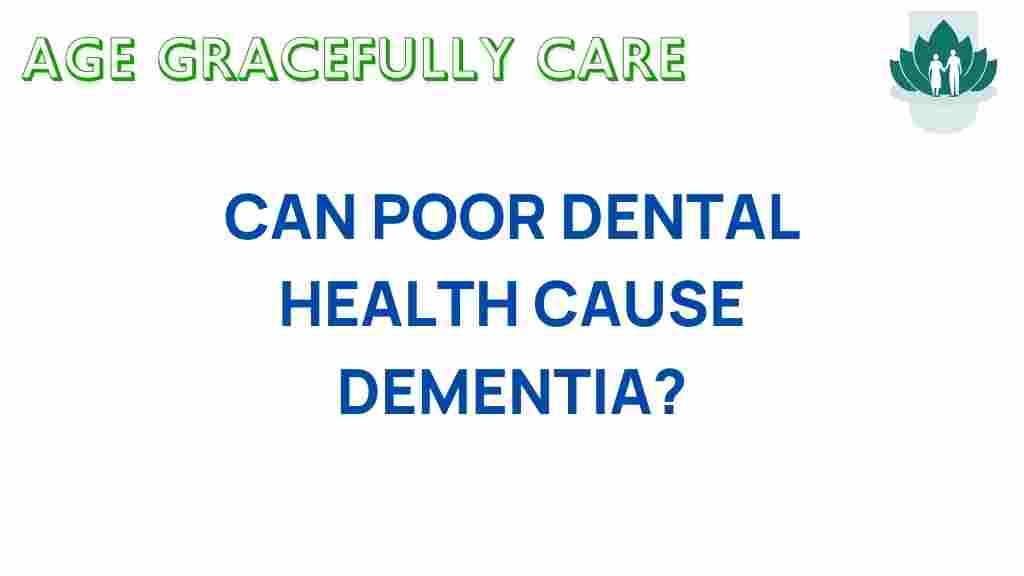Unraveling the Link Between Poor Dental Health and Dementia
As we age, our bodies undergo various changes, and maintaining good dental health becomes increasingly crucial. Recent research has started to uncover a troubling connection between poor oral hygiene and cognitive decline, particularly in relation to dementia and Alzheimer’s disease. This article delves into the intricate relationship between dental health and dementia, exploring the health risks associated with neglecting oral hygiene and offering preventative measures to safeguard both our smiles and our minds.
The Connection Between Dental Health and Dementia
Studies suggest that individuals with poor dental health are at a higher risk of experiencing cognitive decline. The mechanisms behind this link are still being investigated, but researchers have identified several potential pathways:
- Inflammation: Gum disease, or periodontitis, can lead to systemic inflammation. This inflammation is believed to contribute to the development of dementia.
- Bacterial Infection: The bacteria that cause gum disease can enter the bloodstream and potentially reach the brain, leading to neuroinflammation and cognitive impairment.
- Shared Risk Factors: Poor oral hygiene and cognitive decline may share common risk factors, such as diabetes and cardiovascular disease.
The Impact of Aging on Dental Health
Aging significantly affects both dental health and cognitive function. As we age, our body’s ability to fight infections diminishes, making older adults more susceptible to gum disease. Additionally, older adults often experience:
- Decreased saliva production, increasing the risk of cavities and oral infections.
- Changes in medications that may affect oral health.
- Physical limitations that hinder effective oral hygiene practices.
The Role of Oral Hygiene in Prevention
Fortunately, there are several strategies that can help improve dental health and potentially reduce the risk of dementia. Implementing good oral hygiene practices is essential, especially as we age.
Step-by-Step Guide to Maintaining Good Oral Hygiene
To maintain optimal dental health, follow these steps:
- Brush Your Teeth Twice Daily: Use fluoride toothpaste and a soft-bristle toothbrush to gently brush your teeth for at least two minutes.
- Floss Daily: Flossing removes food particles and plaque from between the teeth, where a toothbrush can’t reach.
- Regular Dental Checkups: Visit your dentist at least twice a year for professional cleaning and examination.
- Limit Sugary Foods and Drinks: Reducing sugar intake can decrease the risk of cavities and gum disease.
- Quit Smoking: Tobacco use is a significant risk factor for gum disease and can exacerbate cognitive decline.
- Stay Hydrated: Drink plenty of water to help maintain saliva production, which is essential for neutralizing acids and washing away food particles.
Understanding the Health Risks
Neglecting dental health can lead to various health risks, including:
- Gum Disease: Inflammation and infection of the gums can lead to tooth loss and systemic health issues.
- Heart Disease: Research suggests a link between gum disease and cardiovascular issues, which can further complicate cognitive decline.
- Diabetes Complications: Poor oral health can affect blood sugar levels and complicate diabetes management.
Research Findings on Oral Health and Dementia
Recent studies have shown a strong correlation between poor dental health and increased risk of developing dementia. For instance:
- A study published in the journal Alzheimer’s & Dementia found that individuals with a history of gum disease were 1.5 times more likely to develop dementia.
- Another research project indicated that the presence of certain bacteria in the mouth was associated with increased levels of amyloid plaques in the brain, a hallmark of Alzheimer’s.
Practical Tips for Improving Oral Hygiene
Improving oral hygiene can seem daunting, but small changes can lead to significant benefits:
- Consider using an electric toothbrush, which can be more effective at removing plaque.
- Use an antibacterial mouthwash to help reduce plaque and gingivitis.
- Incorporate a healthy diet rich in fruits and vegetables that promote oral health.
- Stay informed about your oral health by asking your dentist questions during visits.
Addressing Troubleshooting Tips for Common Dental Issues
Even with the best intentions, dental issues can arise. Here are some troubleshooting tips for common problems:
Bad Breath
If you experience persistent bad breath, consider the following:
- Ensure you are brushing and flossing effectively.
- Stay hydrated to help produce saliva.
- Consult your dentist for potential underlying health issues.
Tooth Sensitivity
Tooth sensitivity can be uncomfortable; here’s how to manage it:
- Use toothpaste designed for sensitive teeth.
- Avoid extremely hot or cold foods and drinks.
- Visit your dentist for a professional evaluation.
Gum Bleeding
Bleeding gums can indicate gum disease. To address this:
- Improve your brushing and flossing techniques.
- Schedule an appointment with your dentist for a thorough cleaning.
- Consider dietary changes to enhance gum health.
Conclusion: The Importance of Dental Health in Aging
As we age, the importance of maintaining good dental health cannot be overstated. The relationship between poor oral hygiene and dementia reveals a critical area of concern for individuals and healthcare providers alike. By understanding the risks associated with neglecting dental health and implementing effective prevention strategies, we can significantly improve not just our smiles but also our overall cognitive health.
Incorporating good oral hygiene practices into our daily routine is essential for reducing the risk of cognitive decline and ensuring a healthier aging process. Stay informed, stay proactive, and consult with your dental care provider to keep both your mouth and mind in top shape.
For more information on maintaining good oral health as you age, check out this resource.
This article is in the category Health and created by AgeGracefullyCare Team
